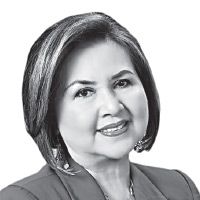How Pinoys Adjust To The Culture Of Saudi Arabia

March 1, 2003 | 12:00am
 RIYADH – The Manila-Riyadh flight on Saudi Air took 12 hours. My husband, Philippine STAR publisher Max Soliven and I joined a delegation of journalists including Inquirer publisher Isagani Yambot, Manila Times editor Jose Galang, Today publisher Chuchay Fernandez, Philippine STAR columnist Chit Pedrosa and ABS-CBN senior vice president in-charge of TFC (The Filipino Channel) Danny Bernardo. Saudi Arabian Ambassador Saleh Mohammad Al-Ghamdi arranged this visit.
RIYADH – The Manila-Riyadh flight on Saudi Air took 12 hours. My husband, Philippine STAR publisher Max Soliven and I joined a delegation of journalists including Inquirer publisher Isagani Yambot, Manila Times editor Jose Galang, Today publisher Chuchay Fernandez, Philippine STAR columnist Chit Pedrosa and ABS-CBN senior vice president in-charge of TFC (The Filipino Channel) Danny Bernardo. Saudi Arabian Ambassador Saleh Mohammad Al-Ghamdi arranged this visit.
Following the strict regulation of clothing for women, we put on our black toga gowns (abbaya) with head cover as we descended at the Riyadh airport. This was September but the heat was stifling since Saudi Arabia, the largest country in the Middle East, is largely a desert.
Civilization started in the Tigris-Euphrates River that divides Middle East. It is strange that the rich ancient cultures of Sumeria, Mesopotamia and Babylon have been transformed into the warring countries of Iraq, Iran and Syria. They are also the borders of Saudi Arabia where our overseas workers are concentrated. Moreover, the Middle East culture, Islam, is a whole world apart from the Philippine lifestyle. What do our OFWs have to learn about Islam and the Muslim world?
"Peace is the essence of Islam," says Prince El Hassan bin Talal of Jordan, brother of the late King Hussein and a descendant of the Prophet Mohammed. "Respecting the sanctity of life is the cornerstone of our faith," he added, "and of all great faiths."
The term Islam is an Arabic word meaning "submission to God’s will," with its etymological roots firmly planted in salam or peace. That may come as a surprise to many non-Muslims, whose perceptions of the faith have been skewed by terrorists, whose unspeakable acts in the name of Islam have been condemned by leaders everywhere.
Muslims accept the teachings of God (Allah) as revealed to the Prophet Mohammed, who was born around 570 AD (1,400 years ago) to a camel-driver at Mecca in present-day Saudi Arabia. He lost both his parents at an early age and worked as a trader with caravans until his mid-twenties, when he married his employer, the twice-widowed, Khadija. For many years he traveled the desert buying and selling goods. He gained a reputation as an honest and learned man.
Muslims accept the five Pillars of Islams as their duties: Shahada – To believe that Allah is the one true God and that Mohammed is the last prophet; Salah – To pray five times a day facing Mecca; Sawn – To fast between sunrise and sunset during the holy month of Ramadan; Zakat – To give charity to the poor; and Hajj – To make a pilgrimage to Mecca at least once during their lifetime.
The underlying message of the Holy Koran is "a prescription for harmony in everyday life," says the imam or spiritual leader. For Muslims the Koran is also a poetic touchstone, a source of the pure Arabic language memorized by Muslim school children and recited by Muslim adults on every important occasion – weddings, funerals, and holidays. In a religion that forbids statuary and icons, this book is the physical manifestation of the faith.
The climate also affects what people wear to protect themselves from the hot sun, harsh wind or swirling sands. For men, the normal outfit is a long white garment called a dishdasha or thobe and on their heads a ghoutra – a square of white material worn in a variety of styles. Though popular with men and boys throughout the region, the red-and-white checked shemagh is also worn as military headdress in some regiments such as the Bedouins.
Cultivating the date palm has always been the most important form of agriculture on the Arabian Peninsula. Archaeologists have found evidence that sates were cultivated over 7,000 years ago. The fruit is so nutritious that it is possible to survive on dates and milk alone. Long desert journeys were only possible because a supply of dates could be taken along to eat when nothing else was available.
Saudi Arabia has over 100 varieties of dates. Dates are picked before they are fully ripe because they will shrivel up in the heat if left on the tree to ripen. Dates are ready for harvesting between July and August.
The hostess burns incense and prepares bottles of various perfumes to offer her guests. In the old days, a major source of wealth from the caravans was the frankincense. It was also used to mummify the dead.
The hostess also blends her own perfumes and keeps the ingredients secret. She chooses a beautiful dress, embroidered with silver or gold thread to wear. Her hands and feet are decorated with henna, which is used for decoration and for its medicinal properties. Painting the soles of the feet with henna is a way of insulating them from the hot sand. It is also said to prevent eyesores and headaches as well as to make her hair shiny and free of dandruff.
Men and women do not mix on social occasions. When guests arrive, they break up into two groups. The men eat in the majlis with the host and the women in the living room with the hostess. The last task of the hostess is to bring around the perfume after the meal. When the guests have enjoyed their choice of fragrances, it is time for everyone to depart.
BrandSpace Articles
<
>



















